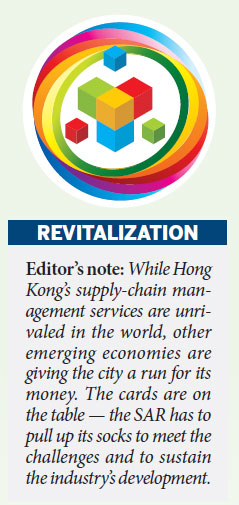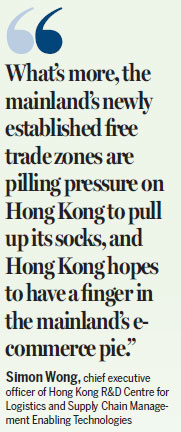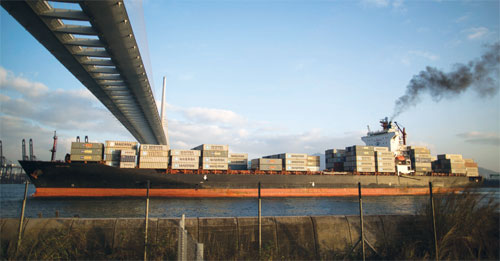Logistics men harping the chained melody down the road
Updated: 2015-05-13 09:08
By Agnes Lu in Hong Kong(HK Edition)
|
|||||||

Hong Kong prides itself on an efficacious supply-chain management services system through which mainland-manufactured products are exported to every corner of the globe.
However, the city's unrivaled status could be up for scrutiny with a host of factors coming into play - Hong Kong's logistics industry is fast losing its competitiveness to other Asian cities, while the mainland, especially the Pearl River Delta's own role as a major global manufacturing base, is shifting to producing more delicate commodities.
Not oblivious to the challenges ahead, Financial Secretary John Tsang Chun-wah, in his Budget speech in February, reassured the industry of its future by praising the commercial sector's tradition of utilizing and relying on supply-chain management.
At the same time, he urged trading and logistics businesses to go for high value-added services to cater to the growing demand in modern supply-chain management.
Responding to Tsang's appeal, academics and professionals well versed in the industry point out that Hong Kong is in dire need of upgrading its supply-chain management services by capitalizing on existing advantages that are unparalleled in the world, but are yet to be fully utilized.
"Basically, all businesses need improved supply-chain management to provide solutions for making and delivering the best products," says Venus Lun, director of the Shipping Research Centre at Hong Kong Polytechnic University.
This could mean initiating a series of activities - from designing to planning worldwide logistics, as well synchronizing supply with demand and evaluating performance globally.
Retail brands, for instance, need to investigate what their customers need most, source the best materials or products they could find, explore whatever means of transportation that would be most cost-effective, assess the quantity of inventory, and map out distribution strategies.
For high value-added goods, such as wine and pharmaceuticals, airfreight with secure, as well as thermal and humidity controllable storage, is of utmost concern to the supply-chain business.
However, for such highly complex activities involving the participation of various economic sectors, Hong Kong's own superiority in some of the segments seems to be shrinking.
Lun said soaring rental costs triggered by an acute scarcity of land in the logistics industry, as well as slowing down trading activities, are denting foreigners' interest in trading with local trading companies.
According to the 2014 Logistics Performance Index published by the World Bank, the SAR ranked 15th globally in overall performance, behind Singapore and Japan, which ranked fifth and 10th, respectively.
Logistics alone accounted for 3.2 percent of Hong Kong's GDP in 2013 - down from 4.8 percent in 2003. Trading took up a shrunk 20.6 percent of GDP, compared with 21.5 percent a decade before that.
Trading and logistics, which are among the city's four pillar industries, have lost 2.4 percentage points proportionately in total GDP from 2003 to 2013.
"Manufacturers on the mainland are producing more delicate goods instead of low-output items, and they communicate with potential buyers directly instead of using Hong Kong as the middleman," noted Simon Wong, chief executive officer of Hong Kong R&D Centre for Logistics and Supply Chain Management Enabling Technologies.
"What's more, the mainland's newly established free trade zones are pilling pressure on Hong Kong to pull up its socks, and Hong Kong hopes to have a finger in the mainland's e-commerce pie," Wong says.
Although Hong Kong's own unique assets are still apparent - an ideal geographical location, good connectivity, reliable services, convenient customs services, higher punctuality - the city needs to do better at the "key junctions" of the supply-chain system.
"In general, supply-chain management comprises three different aspects - the flow from raw materials to the end item, the flow of capital, and flow of information," says Collin Wong Wai-hung, associate dean of the School of Decision Sciences at the Department of Supply Chain Management, Hang Seng Management College.
"That means if we can excel in all three aspects, our supply-chain management services will become more competitive in confronting the ever changing product requirements from global clients and their diminishing patience."
Hong Kong International Airport remains the world's busiest cargo gateway as well as one of the world's busiest passenger airports. More than 63 million passengers used the airport and 4.38 million tons of air cargo passed through the city last year.
At the same time, the SAR has one of the world's best broad-bands and related services, which would be a big plus for e-commerce firms bent on using the city as a new base.
"Hong Kong hails as one of the leading international financial hubs with an advanced financial system and technologies, and how can we not improve our Internet services to facilitate heavier information flow?" asks Simon Wong.
At the same time, there are many payment methods available on the mainland, and Hong Kong needs to combine its traditional financial advantages with technologies, he adds.
According to Collin Wong, her department has been conducting government-funded projects to explore possible high-tech but cost-effective ways to facilitate various operations in the supply chain, such as how to maintain its sustainable development like reducing waste emissions during transportation. "I think only after we've improved ourselves and our business environment, can we think of getting more companies to set up shop here," she says.
agnes@chinadailyhk.com

|
Hailed as one of the leading international financial hubs with an advanced financial system, Hong Kong is urged to improve its Internet services to facilitate heavier information flow and to combine its traditional advantages with e-commerce technologies. Jerome Favre / Bloomberg |
(HK Edition 05/13/2015 page11)
